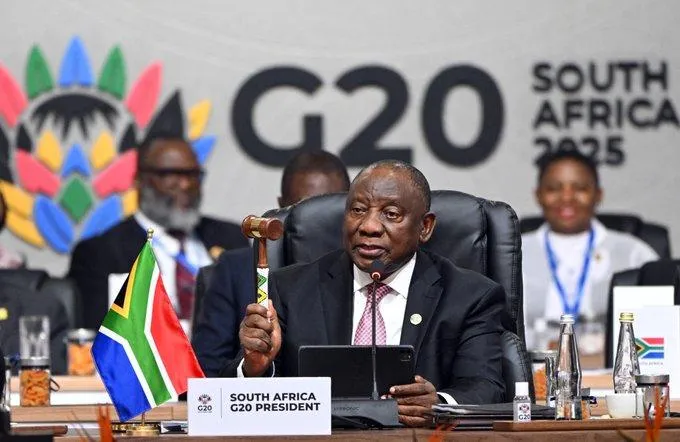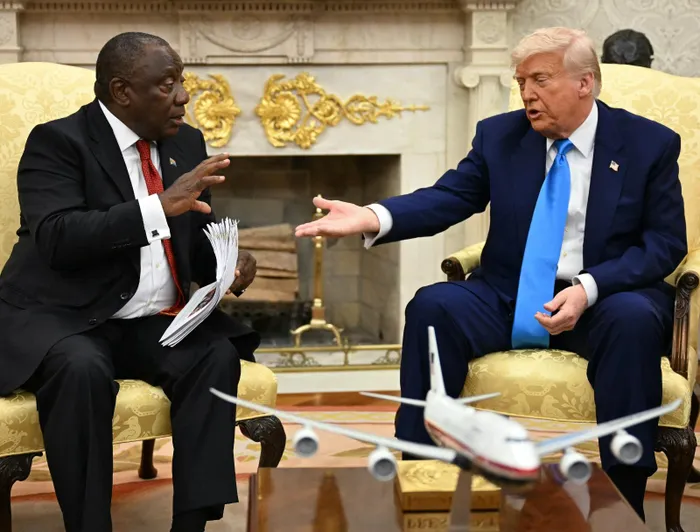
President Cyril Ramaphosa raises the G20 presidency gavel at the closing ceremony in Johannesburg on Sunday. The writer says South Africa needs diversified partnerships has as the country navigates an increasingly precarious geopolitical landscape.
Image: African Union / X
The recent G20 summit held in Johannesburg put a spotlight on South Africa’s aspirations but sadly, it also magnified the increasing discord between Pretoria and Washington. As the summit unfolded, its themes of solidarity, equality, and sustainability resonated. However, they drew sharp rebuke from the Trump administration, signalling a frosty period ahead in US-South Africa relations.
In the aftermath of the summit, President Donald Trump announced that South Africa would not be invited to the 2026 G20 meeting in Miami, stating concerns about the country’s internal policies, including accusations of violence against White Afrikaners and the controversial land reform agenda. These comments, deemed as misinformation by President Cyril Ramaphosa’s office, have added fuel to an already tense diplomatic environment. The South African government expressed disappointment, striving for improved bilateral connections.
The culmination of these tensions saw the suspension of all US aid to South Africa. This move was not only a punitive measure but a clear signal of disapproval regarding the nation’s international alignments, particularly with adversarial nations like China, Russia and Iran. As a direct response to these geopolitical shifts, U.S. Senator Ronny Jackson proposed legislation to allow the continuation of the African Growth and Opportunity Act (AGOA) but explicitly exclude South Africa. This bill reaffirms the US’s intent to reward only those aligning with American interests, potentially undermining South Africa’s economy over the next few years.
The economic implications of this strained relationship are yet to become glaringly visible, likely to emerge within 12 to 24 months as the repercussions cascade through sectors pivotal to employment and growth. The current landscape may appear stable, but much like the delayed effects of interest rate changes on economic activity, so too will the ramifications of these political decisions reveal themselves in time.

The tensions between President Cyril Ramaphosa and US President Donald Trump have ratcheted up post the G20 Summit, which wrapped up in Johannesburg on Sunday.
Image: File/ AFP
Amid this turbulence, some positive news emerged as the US administration announced a temporary reduction on tariffs for specific South African imports, which includes a handful of agricultural products like oranges and macadamia nuts. However, the infamous 30% “Liberation Day tariffs” remain firmly in place for most other exports, signalling a trade landscape that is still riddled with challenges. South African farmers, while gaining a slight respite, must contend with high tariff rates that limit competitiveness against producers from Chile and Peru, who enjoy more favourable conditions.
In response to the precariously shifting economic ground, the South African government has initiated a strategic pivot dubbed the “butterfly strategy,” aimed at diversifying its export avenues. Targeting 27 countries to bolster trade, this strategy reflects a proactive approach to mitigate the potential repercussions of US market access denials. The plan underscores an urgent need to enhance links within Africa and extend South African goods into emerging markets, particularly in Asia and Europe.
It is evident that while the Johannesburg summit aspired towards a more inclusive global governance (with an emphasis on themes relevant to the Global South), the US’s withdrawal from collaborative discourse indicates an unsettling fracturing within multilateral dynamics. The Johannesburg Declaration, embodying commitments to global financial reform and sustainability, poses a direct challenge to US hegemony and ideals.
Moving forward, South Africa faces critical crossroads — whether to remain within the G20 framework or to carve out new paths in international trade networks. The need for diversified partnerships has never been more pronounced, as the country navigates a geopolitical landscape laden with tension and uncertainty.
While the immediate effects of the growing rift may be contained, the spectre of a diminished relationship with the US looms large, demanding that South Africa adapt to both domestic pressures and international perceptions. The coming months will reveal the true cost of this diplomatic chill, as South Africa embarks on its “Plan B” in an increasingly complex global arena.
Mitchell is chief economist at Aluma.
IOS
Related Topics: